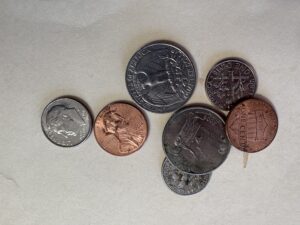*Apologies to Ben Franklin*
It’s funny how quotes get attributed to people. Franklin might not have actually said the quote above, but he did have the right idea with his quote: in the 1737 Poor Richard’s Almanack: “A penny saved is two pence clear.” When you save something today, it likely will grow in worth over time.
We are on the far side of age 75 and enjoying financial security that has resulted from a lifetime of careful spending, good advice, and a bit of luck. A penny saved here and there added up.
We’re not financial experts so this is just how a lifetime of money management enabled us to emerge into good money health despite years of lean income.
Over many years of talking with people facing financial stress we often hear them say, “I need to find a job that pays better.” Well, you might not need to do that. You simply need to spend less and perhaps live in a more affordable geographic location. Dr. Laurie Santos, professor at Yale University, hosts a series on the Science of Well Being. She also hosts a six-week course, the Science of Well-Being for Teens. Participants look closely at their lifestyles and where they spend time and money that drain them, causing them to think they need more. Often it is not true. It’s a great course to take online.
Our Background
We worked in the nonprofit sector, which provided slim salaries and sparse benefits. We liked what we did so never felt compelled to change jobs for better pay. Rather than seek higher pay we used what money we had efficiently.
Financial Philosophy

A Penny Saved is a Penny Earned
Our basic financial philosophy is that however much money a person earns, if he/she spends a little less and consistently invests the difference, financial health increases. Of course, that was partly back in the day when financial institutions gave better interest return on money customers deposited.
Decades Long Strategy
Here’s what we’ve done for over a half century to be financially secure.
- Avoided compulsive, ego spending. Keeping up with the Joneses costs money.
- Developed a long-term relationship with our bank and brokerage as partners. Their advice is free.
- Avoided paying rent and borrowing money. Yup, we drove old cars we could pay cash for and regularly put money in the bank. This earned us interest and avoided loan interest. Then, when we needed to buy a car, we withdrew money and paid cash. We rented apartments briefly but invested in a house purchase. Because we live frugally, we were able to pay off a mortgage early. Now our housing costs are utilities, taxes, and maintenance. No monthly rent or mortgage! It’s a pay-as-we-go philosophy. Granted, we did not “enjoy” some of the exotic trips or coolest stuff and we are better off for it.
- Avoided voluntary taxes. People complain they don’t want to pay taxes. (Benefits exist to paying legitimate taxes) Then, what do they do? Some buy tobacco, alcohol, and gamble.
By doing so, they pay self-imposed high taxes and often end up with health issues. We’ve never smoked, don’t gamble, and enjoy a beer or a sip of wine occasionally. A pack of cigarettes in Iowa costs about $9. If we each smoked two packs a day, our daily cost would be $36. That’s over $13,000 a year. If we’d done this for our 50-year marriage we’d have spent far more on tobacco than to buy our home. - Embraced life cycle cost. For example, it’s common for the least expensive refrigerator to consume the most electricity. Life cycle cost means figuring out what an object will cost during its likely lifespan. Usually paying slightly more upfront for a well-made, efficient device saves chunks of money over time. Energy efficiency saves money! BTW, ditch the inefficient refrigerator or freezer you’ve held on to. Recycle it. Likely you don’t need all the extra stored food. Your electric bill will go down and you have more space in your home.
- Embraced inexpensive recreation. People often carefully calculate the cost for business and home functional items, then spend ridiculously on recreation.
Hobbies
Rich’s hobbies are reading (library books are free), walking, birding, and fishing. He also scrounges and crafts items like bird feeders.
Fishing’s a good example. It can be expensive but doesn’t have to be. A cheap rod and reel costs about 30 bucks and won’t last long. A better one costs about $100 and is durable and efficient, but the very best is around $500. Sticking with the $100 model is the most cost efficient…..and he catches fish from an ancient rowboat purchased at a garage sale. In contrast, an expensive powerboat and electronics need insurance, storage, maintenance, and fuel. Not needed for catching fish.
- We love gardening, which helps lower food costs. Even a small patio can support vegetables you may enjoy.
- Avoid being nickel and dimed to death. It sounds cheap. Only eight dollars a month for a streaming service. $96 a year. Multiply that by six streaming services and that $96 a month costs close to $576 a year. All sorts of other things that seem cheap per month put a constant drain on finances. A few bucks here. A few bucks there. They add up!
- Use our credit card carefully and always pay off the balance on time to avoid interest costs.
Final Words
The upshot is, most people do NOT need to earn more money, they need to learn to use what they have wisely.
We spend carefully yet live richly and have avoided the terror of a heavy debt burden. Our financial strategy has led us in a good direction and we believe it may help others to achieve the same result.


Good one! A second-grade class was in my library one day when a little girl looked at me and asked: “Are you rich?” I thought a minute and answered: “I guess I am because I have enough money to buy pretty much anything I want, but that’s because I don’t want a lot of stuff.”.
Just heard a story about people “being addicted” to buying cheap stuff – kitsch – that citizens were sold a bill of goods on decades ago when jobs began to go overseas to enrich the businesses, cut jobs here and give people the illusion of spending less. And, now we wonder why factories are defunct. A big DUHHHHH! We really do not need 3/4 of the stuff out there.